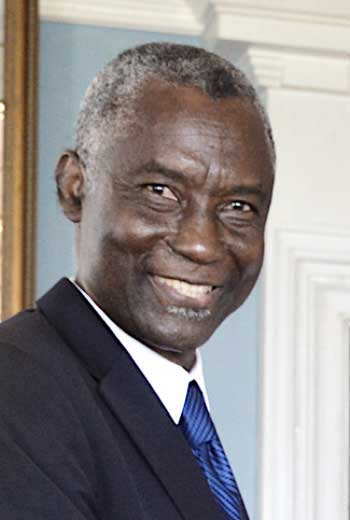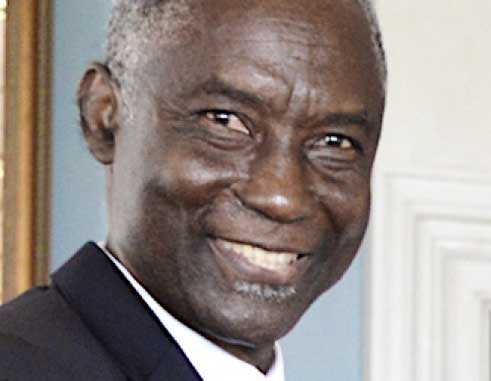
THE point of view that millennia-old African philosophy and the conventions in the music of members of the World African Community could inform the new global order came from Dr. Humphrey A. Regis, a Saint Lucian and a Professor in the School of Communication at Texas Southern University, when he delivered the Frederick Douglass Lecture of the Thomas F. Freeman Honors College of the University early in October.
Dr. Regis expressed that view in the lecture “Becoming a Global Citizen” that drew students, faculty members and administrators from the College and University to its School of Public Affairs building on its campus on October 2.
One idea of globalization Dr. Regis cited seemed to him to view it as a condition or process in which elements in any part of the world affect those in any or many other parts. But he noted that this conception leaves out consideration of the ultimate ends of globalisation.
He reported that many see that end as the achievement of the self-interests of those who can shape and control the global order, but borrowed from Herbert Schiller in proposing that it instead should be a Globalism that celebrates the “realisation” of all in “global civil society.”
Dr. Regis argued that this emphasis moves away from the perception of the constituents of the Universe as individuals – persons, systems, or other seekers of the naked self-interest –toward the view of them as relationships – in “concentric” communities (such as the family, community, nation and world), in “overlapping” communities (that may be religious, ethnic, political or other, and form Venn diagrams), as well as between/among these communities.
He illustrated the difference between the view of the world as made up of individuals and the view of it as made up of relationships by playing the singing of Sanctus from the Latin Mass. He noted the presence of the first view in the singing of the song by only one voice at https://www.youtube.com/watch?v=3aYsIzsaUHE. He noted the presence of the second view in the singing of the same song at https://www.youtube.com/watch?v=jIxEPYkXkU8
Within this framework that sees the “units” of the global community as “relationships,” Dr. Regis anticipated that certain opportunities and challenges, responsibilities and privileges, and benefits, await the citizen of the age of Age of Globalism. He also argued that there is a need for points of reference that can inspire, inform, guide, or direct, these relationships.
Dr. Regis proposed that scholars in the Thomas F. Freeman Honors College, on the way to Becoming Global Citizens, heed points of reference from the World African Community.
He said that one referent is the philosophy of MAAT that guided the Nile Valley Africans that experts call the Kemetu (but others call Ancient Egyptians) for millennia and that has what experts call the interpretations (but others call the “principles”) that include Truth, Justice, Propriety, Harmony, Reciprocity, Balance, and Order.
He argued that one other referent is the music of members of the World African Community, which combines such conventions as call and response, syncopation, diversity within unity, and dialogue among voices. He even said that these conventions may be metaphors for ideal relationships in Globalism, as they seem to embody and promote “coming together” in what the eminent Afrocentricity proponent and elaborator Molefi Kete Asante calls “coherence” but others such as musician Jimmy Cliff who said he thinks “like an African” calls “oneness.” And, he proposed that this “coherence” or “oneness” seems captured in the position of Cliff that “If the community does not benefit from what I do, then, I am not successful.”
When he served as its dean, Dr. Regis developed for the Honors College a program that had a center in academics (as opposed to “activities” or “services”) and included three themes: Interdisciplinarity; simultaneous location of subjects in Local/National/Global context; and the importance Ethics/Aesthetics/Philosophy. One official of the Thurgood Marshall College Fund noted that the program prepared students for roles in the Age of the Global, commended the program for this reason, and even went on to call it “unique.”
Dr. Regis is a former student of Dennery Infant School, Dennery Boys School, the Vieux Fort Comprehensive Secondary School, and Saint Lucia Teachers College. He initiated the Cheikh Anta Diop Awards that help students at VFCSS with their books and examinations in history.
The awards program receives its name from the late multidisciplinary and interdisciplinary Senegalese genius who institutionalized and revolutionised the study of the long history of members of the World African Community – especially over the millennia before they came to the Caribbean and other parts of the western hemisphere.





![Simón Bolívar - Liberator of the Americas [Photo credit: Venezuelan Embassy]](https://thevoiceslu.com/wp-content/uploads/2025/12/Simon-Bolivar-feat-2-380x250.jpg)



